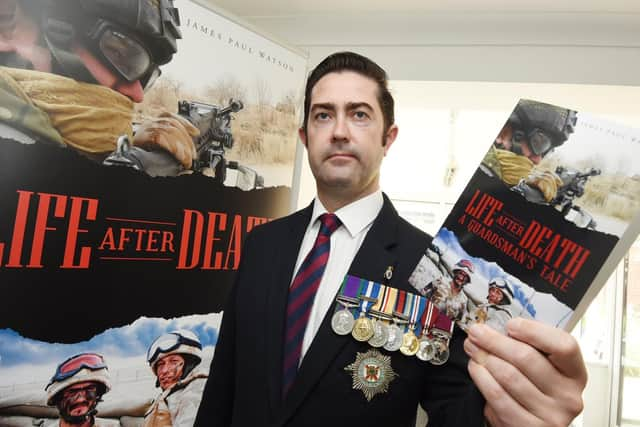Councillor pens hard-hitting book about mental health and the military
and live on Freeview channel 276
Coun James Paul Watson, who represents Atherton ward for the Independent Network (IN), has penned Life After Death – A Guardsman’s Tale, which takes a semi-biographical look at a group of soldiers who serve in the Army for two decades and also analyses the country’s failings when it comes to ensuring their welfare.
Coun Watson was inspired to put pen to paper over Christmas last year when he became frustrated about a rise in suicides among veterans.


Advertisement
Hide AdAdvertisement
Hide AdHe was medically discharged in 2015 after suffering a spinal injury, having trained as a welfare officer when he could no longer serve on the front line.
He was diagnosed with post-traumatic stress disorder (PTSD) in 2017, with the Manchester Arena bombing acting as a trigger event.
The book pulls no punches in its diagnosis of where the military is going wrong supporting soldiers both during and after their time serving the country.
Coun Watson also hopes that opening up so frankly about his own mental health and personal battles will make conversations on what is still a difficult topic for many people much easier.
Advertisement
Hide AdAdvertisement
Hide AdThe 42-year-old, who lives in Atherton, said: “I was getting very fed up looking at the veterans’ suicide rates and I was just thinking about what I could do.
“I have been very open in public about my issues with mental health and trauma with the aim of encouraging others to seek help.
“I’m also highlighting the failings of the welfare system, the Ministry of Defence and the Army in terms of mental health.
“I talk about my struggles with my own mental health and my diagnosis with PTSD.
Advertisement
Hide AdAdvertisement
Hide Ad“I wanted to cross-examine and reflect in an objective manner with hindsight our mistakes and journey as a nation and even as individuals on the battlefield.
“You have to be completely honest with a project like this. There is stuff in this book that I’ve never told my therapist, never told my wife, never told anybody.
“There is no black and white in war, there is so much grey.
“There are some very sad stories in the book, about friends who have completed suicide, there are stories of redemption and of people who have fallen on hard times and clawed themselves back.
“We need to start conversations about mental health in men. If these so-called tough soldiers can suffer and come forward to say they have struggled and needed help it will surely inspire more people to come forward.”
Advertisement
Hide AdAdvertisement
Hide AdCoun Watson wrote the book over an intense period of 10 weeks or so, combing the internet for publicly-available military and medical reports as well as journalism to back up his points.
He also drew heavily on his experience gaining a degree in contemporary military and international history at Salford University for the work.
He spoke critically about the training process soldiers are put through and the lack of support on offer.
He said: “You can’t train soldiers now using the harsh methods they did in the ‘90s, because of the information age where everyone is a reporter.
Advertisement
Hide AdAdvertisement
Hide Ad“It took six months to train a soldier to dehumanise and kill, but where is the reverse of this process when you leave the military to help you back into society?
“We were trained as attack dogs, but attack dogs are put down when their duty with the police is finished.
“There’s no de-escalation process and for me that’s why so many soldiers are in conflict with themselves.
“At one stage we got given a beer and told to man up. When we got back from Iraq we were lined up, put through a tent and asked if we were OK. We signed off on our mental health and that was that.
Advertisement
Hide AdAdvertisement
Hide Ad“Then things progressed to operational stress risk management and trauma management, but in my opinion and experience that’s ineffective, it’s just a paper exercise.”
Coun Watson said he also thinks there should be far more psychological screening done when people enter the military, during their time of service and when they leave.
He also criticised the Army’s determination to protect its reputation, remembering four young soldiers who were dishonourably discharged after being caught smoking cannabis when no questions were asked why they might have wished to take the drug.
Coun Watson says that even though he now feels able to talk openly about his mental health even he struggled to seek help or speak to others about his situation.
Advertisement
Hide AdAdvertisement
Hide AdHe now hopes his full story will encourage others in a similar position.
He said: “Guys I know say to me that I seem so strong and have it all together all the time, but that’s the point.
“I was suffering silently from the genocide I had witnessed in Kosovo for almost 20 years. That was the start of my deteriorating mental health.
“Men don’t talk about my mental health. Someone asked me what the Army was like and I said I had been diagnosed with PTSD.
Advertisement
Hide AdAdvertisement
Hide Ad“He thanked me for saying that because he had struggled with his mental health all his life.
“We need to get more comfortable having these conversations.
“I just want to stop soldiers taking their own lives.”
Coun Watson is holding a book launch event at The Snug Coffee House in Atherton on August 14 from 1pm until 3pm when he will be doing Q&A sessions and signing copies.
Life After Death – A Guardsman’s Tale, by Coun James Paul Watson, is available now from Amazon.
If you value what we do and are able to support us, a digital subscription is just £1 for your first month. Try us today by clicking here and viewing our offers.
